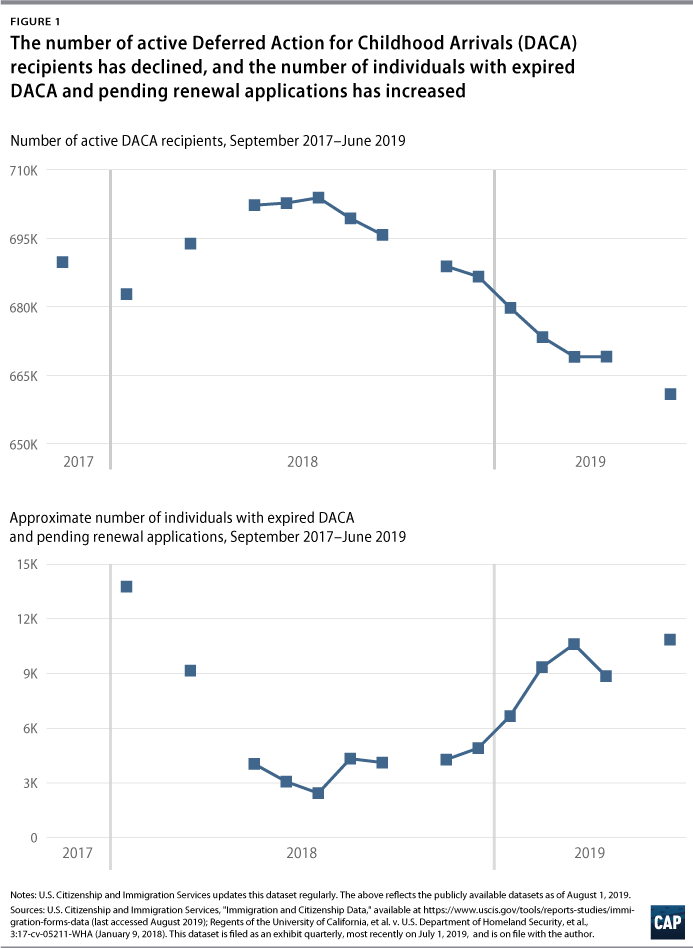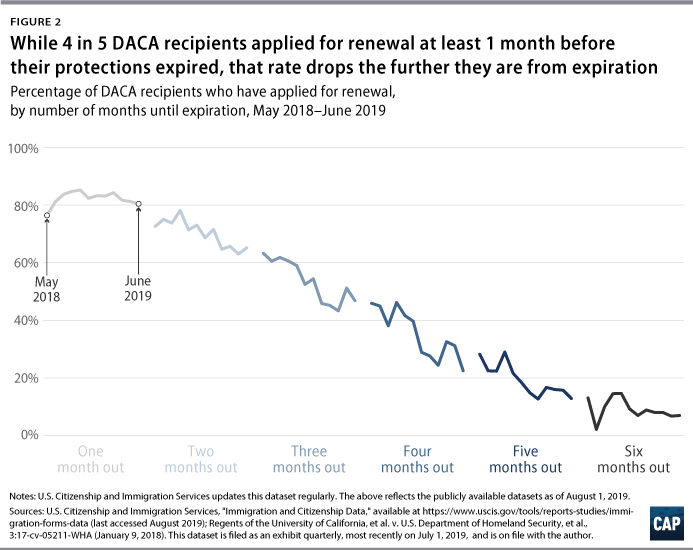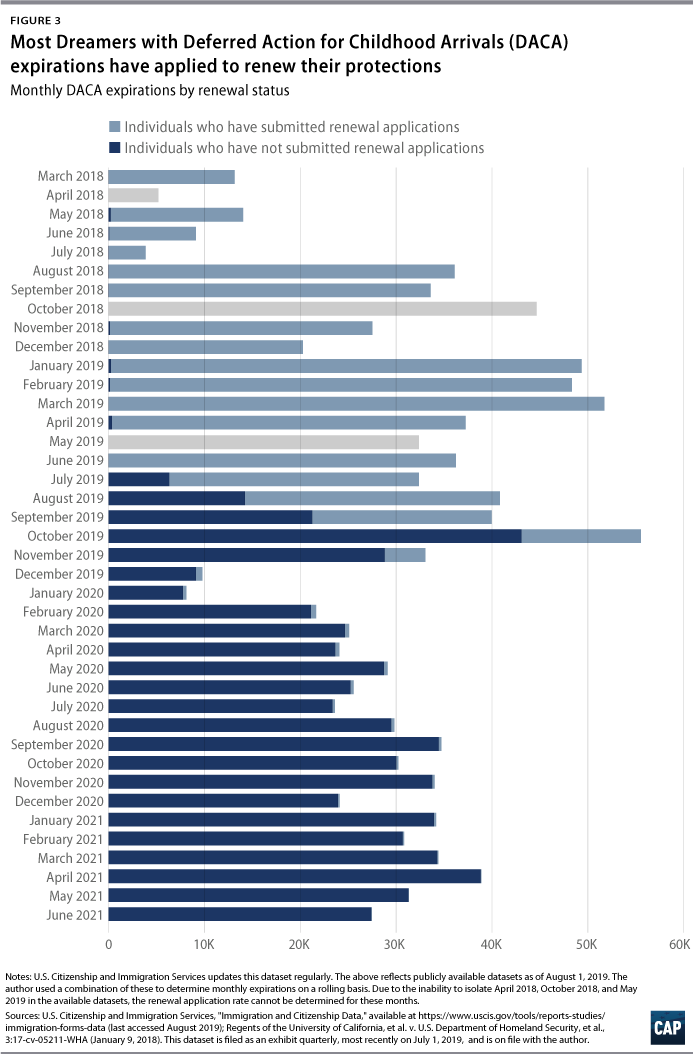This column contains corrections.
On November 12, 2019, the U.S. Supreme Court will hear arguments on whether the Trump administration’s termination of Deferred Action for Childhood Arrivals (DACA) was legal. Although the administration announced the rescission of DACA in September 2017, advocates and states filed multiple lawsuits challenging the decision, and in January 2018, the first federal court to consider the issue entered a preliminary injunction permitting individuals who have, or who once had, DACA to apply to renew their protections. As this and other legal challenges worked their way through the court system, federal courts in two other cases agreed that the termination of DACA was likely unlawful. DACA’s future remains uncertain. And this October presents DACA recipients, immigrants’ rights organizations, legal service providers, and other stakeholders with their greatest mobilization challenge to date. In October alone, nearly 56,000 DACA recipients will see their protections expire if they do not successfully apply to renew—the most potential expirations of any month since the renewal process reopened in January 2018.
Why is October likely to see such large numbers? When former Attorney General Jeff Sessions announced the rescission of DACA on September 5, 2017, he also announced that any Dreamer whose DACA was set to expire between that date and March 5, 2018, could apply for renewal before October 5, 2017. While some Dreamers with DACA expirations in fall 2017 had already applied for renewal, 75,600 DACA recipients applied during that one-month period. Because two-year DACA renewals were granted as of the date of adjudication, it is this cohort of DACA recipients—as well as others who likely applied in the weeks before the rescission announcement—that will see their protections expire beginning in October 2019.
Methodology
Through near-monthly public data releases by U.S. Citizenship and Immigration Services (USCIS), as well as data filed as evidence in Regents of the University of California, et al. v. U.S. Department of Homeland Security, et al. challenging the termination of DACA, the Center for American Progress has tracked renewal applications and adjudications. The latest data filed in response to a court order in Regents covers renewals through June 30, 2019, and are on file with the author.
CAP is also able to provide estimates of when most DACA recipients will need to submit their renewal requests in order to avoid a break in protections, as each USCIS data release has information about how many people will see their DACA expire in each future month. Because DACA is valid for two years, expiration data are currently available through June 2021.
The latest Regents data show that since September 2017:
- The overall number of people who remain protected by DACA is down.
- Most DACA recipients’ applications are approved, but applicants are waiting longer before applying.
- More than 100,000 DACA recipients still need to renew their protections before the end of the calendar year.
The number of active DACA recipients is down
Upon DACA’s termination, USCIS began to publish data using a new characterization of DACA recipients—“active” recipients. Prior data releases only showed the total number of initial, or first-time, and renewal applications that had been approved since DACA began. As of September 4, 2017, the day prior to DACA’s rescission, the initial applications of approximately 800,000 Dreamers had been approved, but there were 689,800 active DACA recipients.* The higher number includes individuals who have adjusted to permanent resident status or who otherwise changed status through a route independent of DACA, as well as individuals who have lost their DACA for some reason, most commonly because they did not renew their protections.
As of June 30, 2019, even fewer Dreamers actively held DACA—660,880. This is the lowest number of DACA recipients post-injunction; the number has been declining each month since July 2018, and it is unlikely to rise. Why is this the case? In combination with the number of active DACA recipients available each month, CAP looked at the number of renewal applications pending with USCIS for Dreamers whose DACA has expired. Because Dreamers who never had DACA previously are currently unable to apply for it, individuals with existing or expired DACA protections are the only people who can have their applications approved and thus increase the number of active recipients. But this pipeline has leveled out, with pending applications for those with expired DACA remaining between 8,860 and 10,860 since February 2019. (see Figure 1)

Most DACA recipients’ renewal applications are approved, but recipients are waiting longer before applying
Since the reopening of the DACA renewal process, 523,860 Dreamers have submitted renewal applications, and USCIS has made progress in reducing the backlog of pending renewal applications. As of June 30, the majority of applications have been adjudicated: 90 percent have been approved, fewer than 1 percent have been denied, and 9 percent remain pending review. (see Figure 2)

While it’s good news that more than half a million DACA recipients—the vast majority of those eligible to date—have renewed their protections, there is a concerning trend in the data: Dreamers are waiting longer to apply to renew their protections. Prior to the rescission of DACA, USCIS recommended that applicants submit their renewals 120 days to 150 days before expiration. However, the most recent data show that only 80 percent of Dreamers with July expirations had applied for renewal through the end of June. Every month this year, 22 percent to 33 percent of DACA recipients submitted their renewals four months—approximately 120 days—in advance of their DACA’s expiration; only 13 percent to 17 percent had done so five months, or approximately 150 days, in advance. These rates have gone down since the injunctions against DACA’s termination reopened the renewal process. It is unclear why DACA recipients are waiting longer to renew their protections, but the confusion surrounding the state of the renewal process, unease at providing updated personal information to the federal government, anxiety over the future of DACA, and the $495 renewal fee are all likely contributors.
The fact that recipients are waiting longer is problematic because if one’s DACA expires while their renewal is pending, they still lose their protection from deportation and work authorization as they await a decision. With more renewals than ever needed in advance of October, a logjam of applications could put pressure on the system, resulting in even longer processing times.
More than 100,000 DACA recipients still need to renew before the end of the year
In the last six months of 2019, from July 1 through the end of the year, 211,490 Dreamers will see their DACA expire if they do not renew. As of June 30, more than half—almost 123,000—of these individuals had yet to submit renewal applications.**
Consider this in the context of the Supreme Court’s schedule. From July 1 to October 31, the months leading up to arguments in the Court, nearly 169,000 Dreamers will see their DACA expire if they do not renew. As of June 30, about half—85,000—of these individuals had already submitted a renewal application. October will be the most serious test yet when it comes to ensuring that DACA recipients maintain their protections, as advocacy groups and service providers get the word out to renew and help raise funds to offset the high cost. As of June 30, more than 43,000 of the 56,000 DACA recipients with October expirations—the first DACA recipients to renew a second time since the rescission—had yet to submit their renewal applications.*** (see Figure 3)

The Supreme Court will hear the DACA arguments in November, and while a decision could come at any point during the first half of 2020, many court-watchers expect a ruling in June 2020. During this time period, 177,000 DACA recipients will need to renew their protections. As of June 30, 2019, about 4 percent had done so. Looking further into the future, 374,000 Dreamers hold DACA that expires in July 2020 or beyond.
Conclusion
With the Supreme Court set to consider whether the administration unlawfully ended DACA, the futures of hundreds of thousands of DACA recipients are up in the air. Congress must do its job and pass legislation to offer permanent protection to these individuals; the passage of H.R. 6 by the U.S. House of Representatives was an important step in this direction, but Senate Majority Leader Mitch McConnell (R-KY) has not signaled any interest in taking up the legislation. But a great deal ultimately hinges on how the U.S. Supreme Court decides the DACA cases. In the meantime, DACA recipients, service providers, and other stakeholders should do all they can to ensure that all active DACA recipients receive the information and support they need to take maximum control over their own futures by filing renewal applications prior to their DACA expiration dates.
Nicole Prchal Svajlenka is a senior policy analyst of Immigration Policy at the Center for American Progress.
* The number of Dreamers whose initial DACA applications were approved has continued to rise as USCIS adjudicated the queue of pending initial applications. As of June 30, 2019, more than 825,000 Dreamers had their initial DACA applications approved.
** Correction, August 15, 2019: This column has been corrected to clarify that this group still had to submit renewal applications as of June 30.
*** Correction, August 15, 2019: This column has been corrected to clarify that these individuals were the first DACA recipients to renew since the rescission.